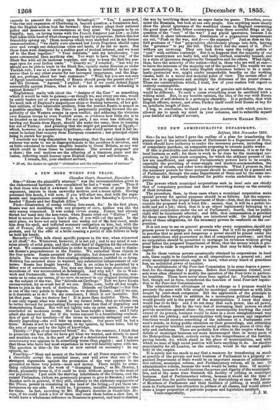THE NEW ADMINISTRATTITE DEPARTMENT.
Belfast, 16th November 1855.
Sin—In my last letter I gave the outline of a plan for transferring the greater part of the private business of Parliament to a Department of State, which should have authority to confer the necessary powers, including that of compulsory purchase, on companies proposing to execute public works. If this is practicable and desirable for the private business, it is so for the local business as well ; for there is work to be done by the municipal cor- porations, as by joint-stook companies, for which the ordinary powers of the law are insufficient, and special Parliamentary powers have to be sought, especially the providing of water-supply and market-accommodation, the widening of streets, and other town improvements. What I propose is, that the necessary powers for these purposes should be conferred by a general act of Parliament, through the same Department of State and by the same ma- chinery as that previously described for public works undertaken by com- panies. The powers which municipal corporations seek in local acts are chiefly that of compulsory purchase and that of borrowing money on the security of their revenues.
The procedure, then, in those cases where a municipal corporation seeks special powers for special purposes should be as follows. Let the corpora- tion prove before the proper Department of State—first, that the intention to execute the proposed work is bona fide ; second, that it will be a public be- nefit and not a job ; third, that it is an object legitimately belonging to a municipal corporation under the act of Parliament; fourth, that no public right will be injuriously affected ; and fifth, that compensation is provided for those cases where private rights are interfered with. On judicial proof given of these allegations, let the necessary powers be conferred on the cor- poration.
It is not easy to see on general grounds why every corporation should not possess power to mortgage its own revenues. But it will be probably right in practice that so great and dangerous a power should be placed under the same restrictions and guarantees as that of compulsory purchase ; and that no corporation should be permitted to mortgage its revenues without giving proof before the proposed Department of State, that the money which it pro- poses thus to raise is required for a purpose that may be fairly charged to capital. As for those various powers occasionally obtained by corporations in local acts, these ought to be conferred on all corporations in a general act ; and every municipal corporation ought to have, what every board of guardians has, an unlimited power of taxation.
The establishment of the Poor-law Commission is in some degree a prece- dent for the change that I propose. Before that Commission existed, local acts were often obtained to modify the operation of the Poor-laws in particu- lar localities. These have never since been applied for. Parliament has in fact, though not in form, transferred the function of local Poor-law legisla- tion to the Poor-law Commissioners.
The administrative advantages of such a change as I propose would be precisely the same with bills sought by municipal corporations as with bills sought by joint-stock companies. But the application of the principle to municipal !bodies would in addition be a momentous political change. It would greatly add to the power of the municipalities. I know that many would fear to do this: and I do not deny that such power, like all power, might be abused. But by the very fact of increasing their powers we shall provide securities against abuse : for every municipality knowing the exact extent of its powers, business would be done in a more straightforward way and with less jobbing ; and municipalities with large powers and important functions would exercise something of the influence of a Parliament over men's minds, in fixing public attention on their proceedings, and attracting men of superior intellect and superior social position into places of civic dig- nity and usefulness. There are probably few cities in the empire where the details of municipal business are more mismanaged than .in many parts of the Metropolitan district, entirely owing to the insignificance of the vestries, paving boards, &e. which stand in the place of municipalities, and with which no man of high social position will have anything to do. An elective municipality for all London, on the contrary, would be the second public body in the empire.
It is surely not too much to say that a measure for transferring as much as possible of the private and local business of Parliament to a properly or- ganized Department of State would be an important measure of administra- tive reform,. municipal reform, and Parliamentary reform, all in one. Of administrative reform, because the work would be better done. Of munici- pal reform, because it would increase the power and dignity of the municipali- ties, and at the same time diminish the facility of jobbing in municipal business. And of Parliamentary reform, because it would set the time of Parliament free for public business ; and, by diminishing at once the labour of Members of Parliament and their facilities of jobbing, it would make seats in Parliament less attractive to jobbers of all class, and would attract there a larger proportion of patriotic purpose and legislative intellect.


































 Previous page
Previous page